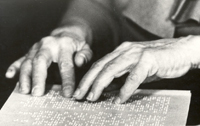Closeup of Helen Keller's hands reading braille.
Like all avid readers, Helen Keller recognized the greatness of Louis Braille's contribution to her and other blind people through her writings and speeches. In 1952, Helen was invited to join the centennial celebrations of Louis' birth in Paris. She was given a Medal of Chevalier of the French Legion of Honor and delivered a speech in French honoring the life and legacy of Louis Braille. The speech is translated here:
Sorbonne, Paris, June 21st, 1952.
Mister President, Professors, Ladies and Gentlemen,
I am touched by the honor you have given me. I cannot help thinking that this honor is not due to any accomplishment of mine, but is rather for the encouragement of the blind and the deaf whom I represent.
On behalf of the blind people of the world, I thank you from the bottom of my heart for having generously recognized the pride and efforts of all those who refuse to succumb to their limitations. In our way, we, the blind, are as indebted to Louis Braille as mankind is to Gutenberg. It is true that the dot system is very different from ordinary print, but these raised letters are, under our fingers, precious seeds from which has grown our intellectual harvest. Without the braille dot system, how incomplete and chaotic our education would be! The dismal doors of frustration would shut us out from the untold treasures of literature, philosophy and science. But, like a magic wand, the six dots of Louis Braille have resulted in schools where embossed books, like vessels, can transport us to ports of education, libraries and all the means of expression that assure our independence.
Look at the strong solidarity that is already taking hold among blind people all over the world, and how, thanks to international braille, they have begun to weave words of kinship among themselves and with humanity. This is truly a symbol of all the years in which blind people have broken through the darkness with the inner light of human knowledge. Blind people of the world simply ask that where their abilities have been successfully put to the test, they are given the chance to participate fully in the activities of their sighted counterparts.
Can I tell you, esteemed faculty of the Sorbonne, my heartfelt thoughts? You have shown a generous interest in the well being of mankind. Above all, you represent France which is always in the forefront of enlightened activity—the country where Louis Braille was born and for whose legacy he worked. How better can we honor his memory than by pursuing the Christian ideal of helping those with disabilities and fostering a public spirit of cooperation that will enable the visually impaired to reach enormous heights of accomplishment and spiritual fulfillment?
Helen Keller
